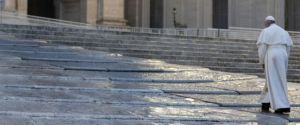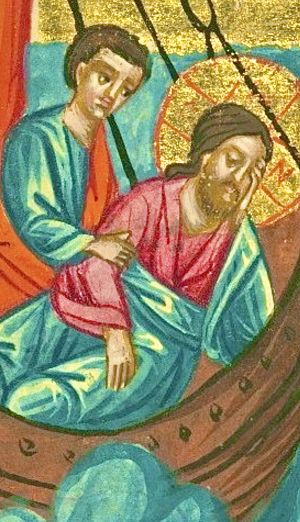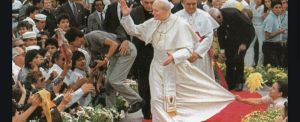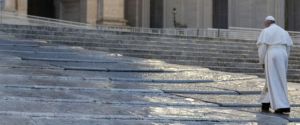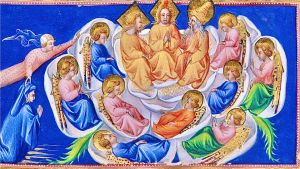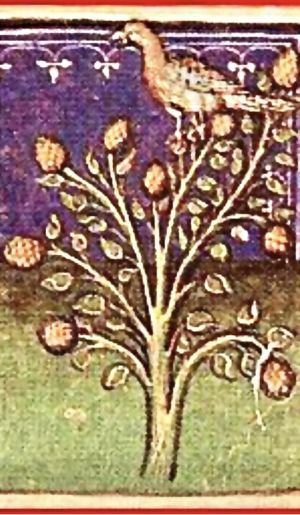
don Giuseppe Nespeca
Giuseppe Nespeca è architetto e sacerdote. Cultore della Sacra scrittura è autore della raccolta "Due Fuochi due Vie - Religione e Fede, Vangeli e Tao"; coautore del libro "Dialogo e Solstizio".
This is not a new ideology
Dear Brothers and Sisters,
On this Fourth Sunday of Ordinary Time, the Gospel presents the first great discourse that the Lord addresses to the people on the gentle hills encircling the Sea of Galilee. “Seeing the crowds,” St Matthew writes, “he went up on the mountain, and when he sat down his disciples came to him. And he opened his mouth and taught them” (Mt 5:1-2).
Jesus, the new Moses, “takes his seat on the cathedra of the mountain” (Jesus of Nazareth, Doubleday, New York 2007, p. 65) and proclaims “blessed” the poor in spirit, those who mourn, the merciful, those who hunger for righteousness, the pure in heart, the persecuted (cf. Mt 5:3-10). It is not a new ideology, but a teaching that comes from on high and touches the human condition, the condition that the Lord, in becoming flesh, wished to assume in order to save it.
Therefore “the Sermon on the Mount is addressed to the entire world, the entire present and future, and yet it demands discipleship and can be understood and lived out only by following Jesus and accompanying him on his journey” (Jesus of Nazareth, p. 69).
The Beatitudes are a new programme of life, to free oneself from the false values of the world and to open oneself to the true goods, present and future. Indeed, when God comforts, he satisfies the hunger for righteousness, he wipes away the tears of those who mourn, which means that, as well as compensating each one in a practical way, he opens the Kingdom of Heaven. “The Beatitudes are the transposition of the Cross and Resurrection into discipleship” (ibid., p. 74). They mirror the life of the Son of God who let himself even be persecuted and despised until he was condemned to death so that salvation might be given to men and women.
An ancient hermit says: “The Beatitudes are gifts of God and we must say a great ‘thank you’ to him for them and for the rewards that derive from them, namely the Kingdom of God in the century to come and consolation here; the fullness of every good and mercy on God’s part … once we have become images of Christ on earth” (Peter of Damascus, In Filocalia, Vol. 3, Turin 1985, p. 79).
The Gospel of the Beatitudes is commented on with the actual history of the Church, the history of Christian holiness, because, as St Paul writes, “God chose what is weak in the world to shame the strong, God chose what is low and despised in the world, even things that are not, to bring to nothing things that are” (1 Cor 1:27-28).
For this reason the Church has no fear of poverty, contempt or persecution in a society which is often attracted by material well-being and worldly power. St Augustine reminds us that “it serves nothing to suffer these evils, but rather to bear them in the Name of Jesus, not only with a serene soul but also with joy” (cf. De sermone Domini in monte, i, 5,13: ccl 35, 13).
Dear brothers and sisters, let us invoke the Virgin Mary, the Blessed par excellence, asking her for the strength to seek the Lord (cf. Zeph 2:3) and to follow him always, with joy, on the path of the Beatitudes.
[Pope Benedict, Angelus, 30 January 2011]
Jesus does not merely proclaim the Beatitudes. He lives the Beatitudes. He is the Beatitudes.
3. “Blessed are you!”, he says, “all you who are poor in spirit, gentle and merciful, you who mourn, who care for what is right, who are pure in heart, who make peace, you who are persecuted! Blessed are you!” But the words of Jesus may seem strange. It is strange that Jesus exalts those whom the world generally regards as weak. He says to them, “Blessed are you who seem to be losers, because you are the true winners: the kingdom of heaven is yours!” Spoken by him who is “gentle and humble in heart” (Mt 11:29), these words present a challenge which demands a deep and abiding metanoia of the spirit, a great change of heart.
You young people will understand why this change of heart is necessary! Because you are aware of another voice within you and all around you, a contradictory voice. It is a voice which says, “Blessed are the proud and violent, those who prosper at any cost, who are unscrupulous, pitiless, devious, who make war not peace, and persecute those who stand in their way”. And this voice seems to make sense in a world where the violent often triumph and the devious seem to succeed. “Yes”, says the voice of evil, “they are the ones who win. Happy are they!”
4. Jesus offers a very different message. Not far from this very place Jesus called his first disciples, as he calls you now. His call has always demanded a choice between the two voices competing for your hearts even now on this hill, the choice between good and evil, between life and death. Which voice will the young people of the twenty-first century choose to follow? To put your faith in Jesus means choosing to believe what he says, no matter how strange it may seem, and choosing to reject the claims of evil, no matter how sensible or attractive they may seem.
In the end, Jesus does not merely speak the Beatitudes. He lives the Beatitudes. He is the Beatitudes. Looking at him you will see what it means to be poor in spirit, gentle and merciful, to mourn, to care for what is right, to be pure in heart, to make peace, to be persecuted. This is why he has the right to say, “Come, follow me!” He does not say simply, “Do what I say”. He says, “Come, follow me!”
You hear his voice on this hill, and you believe what he says. But like the first disciples at the Sea of Galilee, you must leave your boats and nets behind, and that is never easy – especially when you face an uncertain future and are tempted to lose faith in your Christian heritage. To be good Christians may seem beyond your strength in today’s world. But Jesus does not stand by and leave you alone to face the challenge. He is always with you to transform your weakness into strength. Trust him when he says: “My grace is enough for you, for my power is made perfect in weakness” (2 Cor 12:9)!
5. The disciples spent time with the Lord. They came to know and love him deeply. They discovered the meaning of what the Apostle Peter once said to Jesus: “Lord, to whom shall we go? You have the words of eternal life” (Jn 6:68). They discovered that the words of eternal life are the words of Sinai and the words of the Beatitudes. And this is the message which they spread everywhere.
At the moment of his Ascension Jesus gave his disciples a mission and this reassurance: “All power in heaven and on earth has been given to me. Go, therefore, and make disciples of all nations . . . and behold I am with you always, until the end of the age” (Mt 28:18-20). For two thousand years Christ’s followers have carried out this mission. Now, at the dawn of the Third Millennium, it is your turn. It is your turn to go out into the world to preach the message of the Ten Commandments and the Beatitudes. When God speaks, he speaks of things which have the greatest importance for each person, for the people of the twenty-first century no less than those of the first century. The Ten Commandments and the Beatitudes speak of truth and goodness, of grace and freedom: of all that is necessary to enter into Christ’s Kingdom. Now it is your turn to be courageous apostles of that Kingdom!
Young people of the Holy Land, Young people of the world: answer the Lord with a heart that is willing and open! Willing and open, like the heart of the greatest daughter of Galilee, Mary, the Mother of Jesus. How did she respond? She said: “I am the servant of the Lord, let it be done to me according to your word” (Lk 1:38).
O Lord Jesus Christ, in this place that you knew and loved so well, listen to these generous young hearts! Continue to teach these young people the truth of the Commandments and the Beatitudes! Make them joyful witnesses to your truth and convinced apostles of your Kingdom! Be with them always, especially when following you and the Gospel becomes difficult and demanding! You will be their strength; you will be their victory!
O Lord Jesus, you have made these young people your friends: keep them for ever close to you! Amen.
[Pope John Paul II, homily to young people, Mount of Beatitudes, 24 March 2000]
Poor in spirit
This Sunday’s liturgy leads us to meditate on the Beatitudes (cf. Mt 5:1-12) which open up the great so-called Sermon on the Mount, the “Magna Carta” of the New Testament. Jesus manifests God’s desire to lead men to happiness. This message was already present in the preaching of the prophets: God is close to the poor and the oppressed, and delivers them from those who mistreat them. But in this preaching of his, Jesus follows a particular path: he starts with the word “blessed”, that is, happy. He continues with the indication of the condition to be so; and he concludes by making a promise. The cause of blessedness, that is, of happiness, lies not in the requisite condition — for example, “poor in spirit”, “mourning”, “hungry for righteousness”, “persecuted” — but in the subsequent promise, to be welcomed with faith as a gift of God. One starts from a condition of hardship in order to open oneself to God’s gift and enter the new world, the “Kingdom” announced by Jesus. This is not an automatic mechanism, but a way of life in following the Lord, through which the reality of hardship and affliction is seen in a new perspective and experienced according to the conversion that comes about. One is not blessed if one is not converted, capable of appreciating and living God’s gifts.
I pause on the first Beatitude: “Blessed are the poor in spirit, for theirs is the kingdom of heaven” (v. 3). The poor in spirit is he who has assumed the feelings and attitudes of those poor people who, in their state, do not rebel, but who know how to be humble, meek, open to God’s grace. The happiness of the poor — of the poor in spirit — has a twofold dimension: with regard to riches and with regard to God. With regard to possessions, to material possessions, this poverty in spirit is sobriety: not necessarily sacrifice, but the ability to savour the essence, to share; the ability to renew every day the wonder at the goodness of things, without being weighed down in the obscurity of voracious consumption. The more I have, the more I want; the more I have, the more I want: this is voracious consumption. This kills the soul. Men or women who do this, who have this attitude, ‘the more I have, the more I want’, are not happy and will not attain happiness. With regard to God, it is praising and recognizing that the world is a blessing and that at its origin is the creative love of the Father. But it is also opening to Him, docility to his Lordship: it is He, the Lord, He is the Great One. I am not great because I have so many things! It is He: He who wanted the world for all mankind, and who wanted it so that men and women might be happy.
The poor in spirit is the Christian who does not rely on himself, on material wealth, is not obstinate in his own opinions, but who listens with respect and willingly defers to the decisions of others. If in our communities there were more of the poor in spirit, there would be fewer divisions, disagreements and controversies! Humility, like charity, is an essential virtue for living together in Christian communities. The poor, in this evangelical sense, appear to be those who keep alive the objective of the Kingdom of Heaven, offering a glimpse of it revealed as a seed in the fraternal community which favours sharing over ownership. I would like to emphasize this: to favour sharing over ownership. Always having the heart and hands open (he gestures), not closed (he gestures). When the heart is closed (he gestures), it is a shrunken heart. It doesn’t even know how to love. When the heart is open (he gestures), it is on the path of love.
May the Virgin Mary, model and first fruit of the poor in spirit because she is wholly docile to the Lord’s will, help us to surrender ourselves to God, rich in mercy, so that we may be filled with his gifts, especially the abundance of his forgiveness.
[Pope Francis, Angelus, 29 January 2017]
God hostage, or different view of danger
(Mk 4:35-41)
The whole Gospel of Mk is an articulated answer to the question: ‘who is Jesus?’ (v.41). His direction of travel seems to the wrong direction, and brazenly breaks the rules accepted by all.
While the disciples caressed nationalist desires, the Master begins to make it clear that He is not the vulgarly awaited Messiah, restorer of the late empire of David [or the Caesars, in succession struggle under the eyes of Mk’s Roman community: Galba, Oton, Vitellius, Vespasian].
The Kingdom of God is open to all humanity, which in those times of turmoil - torn apart by the civil war after Nero’s follies - sought security, hospitality, points of reference.
Everyone could find a home and shelter there (v.32b).
But some remained insensitive to an overly broad idea of Fraternity. The young Rabbi's proposal displaced them.
The teaching and call imposed on Jesus' intimates is to pass to the other shore (v.35), that is, not to hold back for oneself.
The Father's riches had to be communicated to the pagans.
Yet some “veterans” did not want to know about ‘risky disproportions’. They were calibrated on habits of common religiosity, and a circumscribed ideology of power.
So to exorcise the danger of the mission, they were already trying to take the Master hostage (v.36).
From the very beginning, the resistance to the divine office and the lacerating internal debate that had resulted from it, unleashed great storm in the assemblies of believers.
«And a large wind storm comes and the waves spilled into the boat, so that the boat was already filling up» (v.37).
The storm concerns the disciples, the only dismayed; not Jesus - at the stern, that is, at the helm, driving the boat [v. 38 - and on the «cushion»: it is about the Risen One].
What happens ‘inside’ is not a simple reflection of what happens "outside"! This is the mistake to be corrected.
From the peace of the divine condition that dominates chaos (v.39) the Lord draws attention and reproaches the apostles, accusing them of not having «Faith» (v.40).
In short, are we confused, embarrassed, and is the chaos of the schemes raging? Paradoxically, we are on the right path of the Exodus - but we must not get caught up in fear.
Emotionally relevant situations make sense, carry a meaningful appeal, introduce a different introspection, the decisive change; a new 'Genesis'.
Trial in fact activates souls in the most effective way, because it disengages us from the idea of stability, and brings us into contact with dormant energies, initiating the ‘new dialogue with events’.
In Him, we are therefore imbued with a different vision of danger.
Indeed, it seems that Jesus expressly wants the “dark moments” of confrontation and doubt (v.35).
Textbook expectations and the habit of setting up conformist harmonies block the flowering of what we are and hope for.
What is annoying or even ‘against’ has something decisive to tell us.
So even in the little boat of the churches (v.36) the discomfort must express itself.
Ours is an inverted, upside down, unequaled stability - uncertain, inconvenient - yet energetic, capable of reinventing itself.
It will even be excessive, but from the disruptions. And observing in others our own dark sides.
For a proposal of Tenderness without a plan, not corresponding; wich is not a relaxation area.
Love that rhymes with terrible anxiety, which however puts us in immediate contact with our deepest layers - and the ‘suburbs’!
[Saturday 3rd wk. in O.T. January 31, 2025]
God as hostage, or the different view of danger
(Mk 4:35-41)
Excita, Domine, potentiam tuam, et veni
"Excita, Domine, potentiam tuam, et veni" - with these and similar words the Church's liturgy repeatedly prays [...].
These invocations were probably formulated in the period of the decline of the Roman Empire. The disintegration of the supporting orders of law and of the basic moral attitudes, which gave them strength, caused the breaking of the banks that had hitherto protected peaceful coexistence between men. A world was passing away. Frequent natural cataclysms further increased this experience of insecurity. No force could be seen to halt this decline. All the more insistent was the invocation of God's own power: that He would come and protect men from all these threats.
"Excita, Domine, potentiam tuam, et veni". Today, too, we have many reasons to associate ourselves with this prayer [...] The world with all its new hopes and possibilities is, at the same time, distressed by the impression that the moral consensus is dissolving, a consensus without which legal and political structures do not function; consequently, the forces mobilised to defend these structures seem doomed to failure.
Excita - the prayer is reminiscent of the cry addressed to the Lord, who was sleeping in the disciples' storm-tossed boat that was close to sinking. When His powerful word had calmed the storm, He rebuked the disciples for their little faith (cf. Mt 8:26 and par.). He wanted to say: in yourselves faith has slept. He also wants to say the same thing to us. Even in us so often faith sleeps. Let us therefore pray to Him to awaken us from the sleep of a faith that has become tired and to restore to faith the power to move mountains - that is, to give right order to the things of the world.
[Pope Benedict, to the Roman Curia 20 December 2010].
The whole Gospel of Mark is an articulate answer to the question: 'who is Jesus?' (v.41).
The direction of travel imposed by Jesus on his followers seems to go against the grain, and brazenly breaks the rules accepted by all.
While the disciples were fondling nationalist desires, the Master begins to make it clear that He is not the vulgarly expected Messiah, restorer of the defunct empire of David.
[Or of the Caesars, then struggling for succession under the eyes of the Roman community of Mk: Galba, Otone, Vitellius, Vespasian].
The Kingdom of God is open to all mankind, who in those turbulent times - torn apart by the swift but bloody civil war that followed Nero's follies - sought security, welcome, points of reference.
Everyone could find home and shelter there (Mk 4:32b).
But the still Judaizing apostles and church veterans seemed averse to Christ's proposals; they remained insensitive to an overly broad idea of fraternity.
Compared to the teaching received from the fathers of the ancient tradition, the young Rabbi's proposal displaced them.
It is a problem that is still alive and very serious.
The teaching and reminder imposed on Jesus' intimates was to pass to the other shore (Mk 4:35; Lk 8:22), that is, not to keep for oneself.
The riches of the Father were to be communicated to the pagans, commonly considered unclean and infamous.
Yet his people did not want to know about risky disproportions, which would make the unpredictable action of the Son of God stand out.
They were calibrated to common religiosity customs and a circumscribed ideology of power.
So to exorcise the danger of the mission - and having to accommodate people, rework situations, welcome surprises that would agitate them [questioning them] - they attempted to take the Master hostage (v.36).
From the very beginning, the resistance to the divine commission and the resulting lacerating internal debate stirred up a great storm in the assemblies of believers.
"And behold, there came a great stirring in the sea, so that the boat was covered with waves" (Mt 8:24).
"And there came a great gale of wind, and the waves rolled into the boat, so that the boat was already filled" (Mk 4:37).
The storm affected only the disciples, the only ones dismayed; not Jesus: "but he was asleep" (Mt 8:24).
"In the stern" (Mk 4:38), that is, at the helm, leading.
And "on the pillow" (Mk 4:38): this is the Risen One - well alive although apparently absent.
What happens "inside" is not a mere reflection of what happens "outside"! This is the error to be corrected.
Such identification blocks and makes life chronic, starting with the handling of emotionally relevant situations - which have their own meaning.
They carry a meaningful appeal, they introduce a different eye and dialogue.
Even from the peace of the divine condition that dominates chaos, the Lord calls attention to and rebukes the apostles, accusing them of not having "Faith" (v.40).
Here by Faith is meant an ounce of risk of love - like a "mustard seed" (v.31) - to be brought to humanity for renewal.
In short, we are confused, embarrassed, and the chaos of schemes rages on, not excluding healthy selfishness for our destiny?
We are paradoxically on the right path of the Exodus - but we must not get caught up in fear.
In Him, we are imbued with a different view of danger.
Says the Tao Tê Ching (xxii): "The saint does not see by himself, therefore he is enlightened. Even in straits.
Indeed, it seems that Jesus expressly wanted the dark moments of confrontation and doubt for the apostles (Mk 4:35; Lk 8:22b).
This is also true for us, even if we were church leaders; otherwise there will be no cleansing from repetitive convictions.
Textbook expectations and the habit of setting up conformist harmonies block the flowering of what we are and hope for.
Especially what is annoying or even 'against' has something decisive to tell us.
Even in the little boat of the churches (Mk 4:36), discomfort must express itself:
"And He was in the stern, on the pillow, asleep. And they woke him up and said to him, "Master do you not care that we are lost?" (v.38).
"And drawing near they woke him, saying, Lord, save us, we are lost" (Mt 8:25).
All this is to revive the essence of each person and of the community itself.
To introduce the hidden or repressed change, and to activate it in the most effective way.
In every situation, it is good to be activated by contact with the hidden or primordial energies.
More than opposing frictions and conflicting external events, anxiety, impression and anguish come from the very fear of facing the normal or decisive questions of existence.
This is out of mistrust: feeling in danger perhaps only because we perceive ourselves to be intimately undeveloped, incapable of other conversation, of having the guts to discover and rework, convert, or remodel.
The fatigue of questioning ourselves and the suffering that the adventure of Faith holds, will also fade amidst the discomfort of the rough sea - which precisely does not want us to return to 'those of before'.
It is enough to disengage ourselves from the idea of stability, even religious stability, and listen to life as it is, embracing it.
Recognising it as one's own even in its crowd of bumps, bitterness, dashed hopes of harmony, sorrows...
Engaging with this flood of new emergencies, and encountering one's own profound nature.
The best vaccine against the anxieties of the adventure together with Christ on the changing waves of the unexpected, will be precisely not to avoid worries upstream - on the contrary, to go towards them and welcome them; to recognise them, to let them happen.
Even in times of global crisis, the apprehensions that seem to want to devastate us, come to us as preparatory energies of other joys that wish to break through.
The upheavals are arranging new cosmic attunements; for wonderment starting with ourselves. As a present guide, and an appeal from beyond.
Our little boat is in an inverted stability, upside down, unequal - uncertain, inconvenient - yet energetic, prickly, capable of reinventing itself.
It may even be excessive, but it is disruptive. And by observing in others their own dark sides.
For a proposal of Tenderness without a plan, not corresponding; which is not a relaxation zone.
Love that rhymes with terrible anxiety, which, however, puts us in immediate contact with our deepest layers - and peripheries!
To internalise and live the message:
On what occasions have you found easy what previously seemed impossible?
Do you ever get in the way?
Is your life the same or different - able to address and accommodate the distant or new?
Some other providence, which you ignore
"It is good not to fall, or to fall and rise again. And if you do happen to fall, it is good not to despair and not to become estranged from the love the Sovereign has for man. For if he wills, he can do mercy to our weakness. Only let us not turn away from him, let us not be distressed if we are forced by the commandments, and let us not be disheartened if we come to nothing [...].
Let us neither hurry nor retreat, but always begin again [...].
Wait for him, and he will show you mercy, either by conversion or by trials, or by some other providence that you do not know."
[Peter Damascene, Second Book, Eighth Discourse, in La Filocalia, Turin 1982, I,94].
A mixture of fear and trust, or total and pure abandonment
We have just heard the Gospel reading of the calming of the storm, which was presented with a brief but incisive passage from the Book of Job, in which God reveals himself as the Lord of the sea. Jesus rebukes the wind and orders the sea to be calm, he speaks to it as if it were identified with the power of the devil. In fact, according to what the First Reading and Psalm 107[106] tell us, in the Bible the sea is considered a threatening, chaotic and potentially destructive element which God the Creator alone can dominate, govern and calm.
Yet, there is another force a positive force that moves the world, capable of transforming and renewing creatures: the power of "Christ's love" (2 Cor 5: 14) as St Paul calls it in his Second Letter to the Corinthians not, therefore essentially a cosmic force, but rather divine, transcendent. It also acts on the cosmos but, in itself, Christ's love is "another" power and the Lord manifested this transcendent otherness in his Pasch, in the "holiness" of the "way" he chose to free us from the dominion of evil, as happened for the Exodus when he brought the Jews out of Egypt through the waters of the Red Sea. "Your way, O God, is holy", the Psalmist exclaims, "Your way was through the sea/ your path through the great waters" (Ps 77[76]: 13, 19). In the Paschal Mystery, Jesus passed through the abyss of death, because in this way God wanted to renew the universe through the death and Resurrection of his Son, who "died for all", that all might live "for him who for their sake died and was raised" (2 Cor 5: 15), and not live for their own sake alone.
The solemn gesture of calming the stormy sea was a clear sign of Christ's lordship over negative powers and induces one to think of his divinity: "Who then is this", his own Disciples asked fearfully, "that even wind and sea obey him?" (Mk 4: 41). Their faith is not yet firm, it is being formed; it is a mingling of fear and trust; on the other hand, Jesus' confidant abandonment to the Father is total and pure. This is why he could sleep during the storm, completely safe in God's arms. The time would come, however, when Jesus too would feel fear and anguish, when his hour came he was to feel the full burden of humanity's sins upon him, like a wave at high tide about to break over him. That was indeed to be a terrible tempest, not cosmic but spiritual. It was to be the final, extreme assault of evil against the Son of God.
Yet, in that hour Jesus did not doubt in the power of God the Father or in his closeness, even though he had to experience to the full the distance of hatred from love, of falsehood from the truth, of sin from grace. He experienced this drama in himself with excruciating pain, especially in Gethsemane, before his arrest, and then throughout his Passion until his death on the Cross. In that hour, Jesus on the one hand was one with the Father, fully abandoned to him; on the other, since he showed solidarity to sinners, he was as it were separated and felt abandoned by Him.
[Pope Benedict, homily 21 June 2009]
Sign of a constant Presence
The storm calmed on the Lake of Genesaret can be reread as a "sign" of Christ's constant presence in the "boat" of the Church, which many times throughout history is exposed to the fury of the winds during stormy hours. Jesus, awakened by the disciples, commands the winds and the sea to be becalmed. Then he says to them, "Why are you so fearful? Have you no faith yet?" (Mk 4:40). In this, as in other episodes, one can see Jesus' desire to inculcate in the apostles and disciples faith in his operative and protective presence even in the most stormy hours of history, in which doubt about his divine assistance could infiltrate the spirit. In fact, in Christian homiletics and spirituality, the miracle has often been interpreted as a 'sign' of Jesus' presence and a guarantee of trust in him on the part of Christians and the Church.
[Pope John Paul II, General Audience 2 December 1987]
Against the tidal waves, one must look to the Lord and raise one's voice
Today’s liturgy tells the episode of the storm calmed by Jesus (Mk 4:35-41). The boat in which the disciples are crossing the lake is beaten by the wind and the waves and they fear they will sink. Jesus is with them on the boat, yet he is in the stern asleep on the cushion. Filled with fear, the disciples cry out to him: “Teacher, do you not care if we perish?” (v. 38).
And quite often we too, beaten by the trials of life, have cried out to the Lord: “Why do you remain silent and do nothing for me?”. Especially when it seems we are sinking, because love or the project in which we had laid great hopes disappears; or when we are at the mercy of unrelenting waves of anxiety; or when we feel we are drowning in problems or lost amid the sea of life, with no course and no harbour. Or even, in moments in which the strength to go forward fails us, because we have no job, or an unexpected diagnosis makes us fear for our health or that of a loved one. There are many moments when we feel we are in a storm; when we feel we are almost done in.
In these situations and in many others, we too feel suffocated by fear and, like the disciples, risk losing sight of the most important thing. In the boat, in fact, even if he is sleeping, Jesus is there, and he shares with his own all that is happening. If on the one hand his slumber surprises us, on the other, it puts us to the test. The Lord is there, present; indeed, he waits — so to speak — for us to engage him, to invoke him, to put him at the centre of what we are experiencing. His slumber causes us to wake up. Because to be disciples of Jesus, it is not enough to believe God is there, that he exists, but we must put ourselves out there with him; we must also raise our voice with him. Hear this: we must cry out to him. Prayer is often a cry: “Lord, save me!”. I was watching, on the programme “In his Image”, today, the Day of Refugees, many who come in large boats and at the moment of drowning cry out: “Save us!”. In our life too the same thing happens: “Lord, save us!”, and prayer becomes a cry.
Today we can ask ourselves: what are the winds that beat against my life? What are the waves that hinder my navigation, and put my spiritual life, my family life, even my psychological life in danger? Let us say all this to Jesus; let us tell him everything. He wants this; he wants us to grab hold of him to find shelter from the unexpected waves in life. The Gospel recounts that the disciples approach Jesus, wake him and speak to him (cf. v. 38). This is the beginning of our faith: to recognize that alone we are unable to stay afloat; that we need Jesus like sailors need the stars to find their course. Faith begins from believing that we are not enough for ourselves, from feeling in need of God. When we overcome the temptation to close ourselves off, when we overcome the false religiosity that does not want to disturb God, when we cry out to him, he can work wonders in us. It is the gentle and extraordinary power of prayer, which works miracles.
Jesus, begged by the disciples, calms the wind and waves. And he asks them a question, a question which also pertains to us: “Why are you afraid? Have you no faith?” (v. 40). The disciples were gripped with fear, because they were focused on the waves more than on looking at Jesus. And fear leads us to look at the difficulties, the awful problems, and not to look at the Lord, who many times is sleeping. It is this way for us too: how often we remain fixated on problems rather than going to the Lord and casting our concerns to him! How often we leave the Lord in a corner, at the bottom of the boat of life, to wake him only in a moment of need! Today, let us ask for the grace of a faith that never tires of seeking the Lord, of knocking at the door of his Heart. May the Virgin Mary, who in her life never stopped trusting in God, reawaken in us the basic need of entrusting ourselves to him each day.
[Pope Francis, Angelus 20 June 2021]
Blessed are the poor in spirit, because of the Holy Spirit
Rhythm of Nature. The evolutionary factor
From below, not from a summit
(Mk 4: 26-34)
Here we are introduced to a different mentality, to a new Family, to another Kingdom, not very "elevated"; indeed, completely reversed. Different from that expected on a mighty mountain (Ez 17:22).
It will not be portrayed by the majesty of the cedar of Lebanon [which once covered the mountain slopes of the Near East] but by a simple shrub in the kitchen garden (Mk 4:32a).
And the very origins of this new reality will not come from the top of a lofty stem, but from a small seed, simply planted on the ground.
Little grain like the others. Nothing remarkable in itself. Which develops horizontally, rather (v.32b).
How much gas must be given to accelerate the spread of the Kingdom?
According to Jesus, we must wait for everyone to meet himself, without neuroses.
A proposal that knows no borders: it’s aimed at everyone. It is enough to let the grain do its normal things - thus integrating the energies; giving space, even giving way.
The Seed grows on its own, intertwined with the soil and climate, yet according to a deep individual character.
He escapes cerebral explanations: «How, it itself does not know» (v.27).
After sowing, the author of the gesture resumes normal life.
Letting it go, the little hidden grain walks its way, to the end.
This is the evolutionary factor.
No farmer tramples on his field, nor investigates what happens (bothering the seedlings): development, growth and maturation are in themselves guaranteed.
Anyone who wants to enter would disturb the sprouts.
Whoever dug to control the evolution of little bud that is intertwining its roots with the ground, would ruin everything.
Our sacred identity is inextricably linked to personal singularity: it entangles with an unrepeatable sensitivity and vicissitude.
It’s the darkness, the silence, the waiting, that make tender shoots sprout, in their uniqueness and authenticity.
They would only be harmed by the one who wanted to interfere, modifying, overlapping other patterns and trends - never conforming to the realities in spontaneous singular development.
Beware of the hastiness of those who immediately want a result other than to be ourselves in relation to the innate essence and personal mission, which emanate from the hidden Source.
Time of love is not immediate: it takes place along a path, whose periods cannot be marked by any hasty plan - only irritating - if not by the Spirit, so that we can manifest the intrinsic unprecedented.
No one can bother such exceptional wealth, which arises and develops «automatically» (v.28), so that we are enabled to give birth to the inner world, the quintessence, the Jesus who hatches in heart; not others.
«Laying hold of the scythe» (v.29) means that at this point the soul is awakened for the Kingdom, ready to ‘give life’ to itself and to brethren, overflowing its wholeness to others, even distant or wandering like birds (v.32).
Together, a Church that - without thinking too much about "how it should be" - convinces all those in need of shelter from the "heat".
And Seed can be transmitted anywhere by the same «volatiles» that settle there even just enough for each one to take flight again.
‘Parables of the kingdom’ in Mt 13 and here in Mk 4 do not narrate a solemn, epochal, majestic reality that stubborns and imposes itself.
Rather, the new kingdom will be comparable to a common shrub, which grows modestly - silent, in the home garden (v.32).
As if to say: we evolve into tiny signs - nothing extraordinary - but we are people, not facsimiles.
Thus we announce Paradise.
[Friday 3rd wk. in O.T. January 30, 2026]
The image of the vineyard is clear: it represents the people whom the Lord has chosen and formed with such care; the servants sent by the landowner are the prophets, sent by God, while the son represents Jesus. And just as the prophets were rejected, so too Christ was rejected and killed (Pope Francis)
L’immagine della vigna è chiara: rappresenta il popolo che il Signore si è scelto e ha formato con tanta cura; i servi mandati dal padrone sono i profeti, inviati da Dio, mentre il figlio è figura di Gesù. E come furono rifiutati i profeti, così anche il Cristo è stato respinto e ucciso (Papa Francesco)
‘Lazarus’ means ‘God helps’. Lazarus, who is lying at the gate, is a living reminder to the rich man to remember God, but the rich man does not receive that reminder. Hence, he will be condemned not because of his wealth, but for being incapable of feeling compassion for Lazarus and for not coming to his aid. In the second part of the parable, we again meet Lazarus and the rich man after their death (vv. 22-31). In the hereafter the situation is reversed [Pope Francis]
“Lazzaro” significa “Dio aiuta”. Lazzaro, che giace davanti alla porta, è un richiamo vivente al ricco per ricordarsi di Dio, ma il ricco non accoglie tale richiamo. Sarà condannato pertanto non per le sue ricchezze, ma per essere stato incapace di sentire compassione per Lazzaro e di soccorrerlo. Nella seconda parte della parabola, ritroviamo Lazzaro e il ricco dopo la loro morte (vv. 22-31). Nell’al di là la situazione si è rovesciata [Papa Francesco]
Brothers and sisters, a frequent flaw of those in authority, whether civil or ecclesiastic authority, is that of demanding of others things — even righteous things — that they do not, however, put into practise in the first person. They live a double life. Jesus says: “They bind heavy burdens, hard to bear, and lay them on men’s shoulders; but they themselves will not move them with their finger (v.4). This attitude sets a bad example of authority, which should instead derive its primary strength precisely from setting a good example. Authority arises from a good example, so as to help others to practise what is right and proper, sustaining them in the trials that they meet on the right path. Authority is a help, but if it is wrongly exercised, it becomes oppressive; it does not allow people to grow, and creates a climate of distrust and hostility, and also leads to corruption (Pope Francis)
Fratelli e sorelle, un difetto frequente in quanti hanno un’autorità, sia autorità civile sia ecclesiastica, è quello di esigere dagli altri cose, anche giuste, che però loro non mettono in pratica in prima persona. Fanno la doppia vita. Dice Gesù: «Legano infatti fardelli pesanti e difficili da portare e li pongono sulle spalle della gente, ma essi non vogliono muoverli neppure con un dito» (v.4). Questo atteggiamento è un cattivo esercizio dell’autorità, che invece dovrebbe avere la sua prima forza proprio dal buon esempio. L’autorità nasce dal buon esempio, per aiutare gli altri a praticare ciò che è giusto e doveroso, sostenendoli nelle prove che si incontrano sulla via del bene. L’autorità è un aiuto, ma se viene esercitata male, diventa oppressiva, non lascia crescere le persone e crea un clima di sfiducia e di ostilità, e porta anche alla corruzione (Papa Francesco)
This is the road Jesus points out to all who want to be his disciples: "Judge not... condemn not... forgive, and you will be forgiven; give, and it will be given to you.... Be merciful, even as your Father is merciful" (Lk 6: 36-38). In these words we find very practical instructions for our daily conduct as believers [Pope Benedict]
duevie.art
don Giuseppe Nespeca
Tel. 333-1329741
Disclaimer
Questo blog non rappresenta una testata giornalistica in quanto viene aggiornato senza alcuna periodicità. Non può pertanto considerarsi un prodotto editoriale ai sensi della legge N°62 del 07/03/2001.
Le immagini sono tratte da internet, ma se il loro uso violasse diritti d'autore, lo si comunichi all'autore del blog che provvederà alla loro pronta rimozione.
L'autore dichiara di non essere responsabile dei commenti lasciati nei post. Eventuali commenti dei lettori, lesivi dell'immagine o dell'onorabilità di persone terze, il cui contenuto fosse ritenuto non idoneo alla pubblicazione verranno insindacabilmente rimossi.




